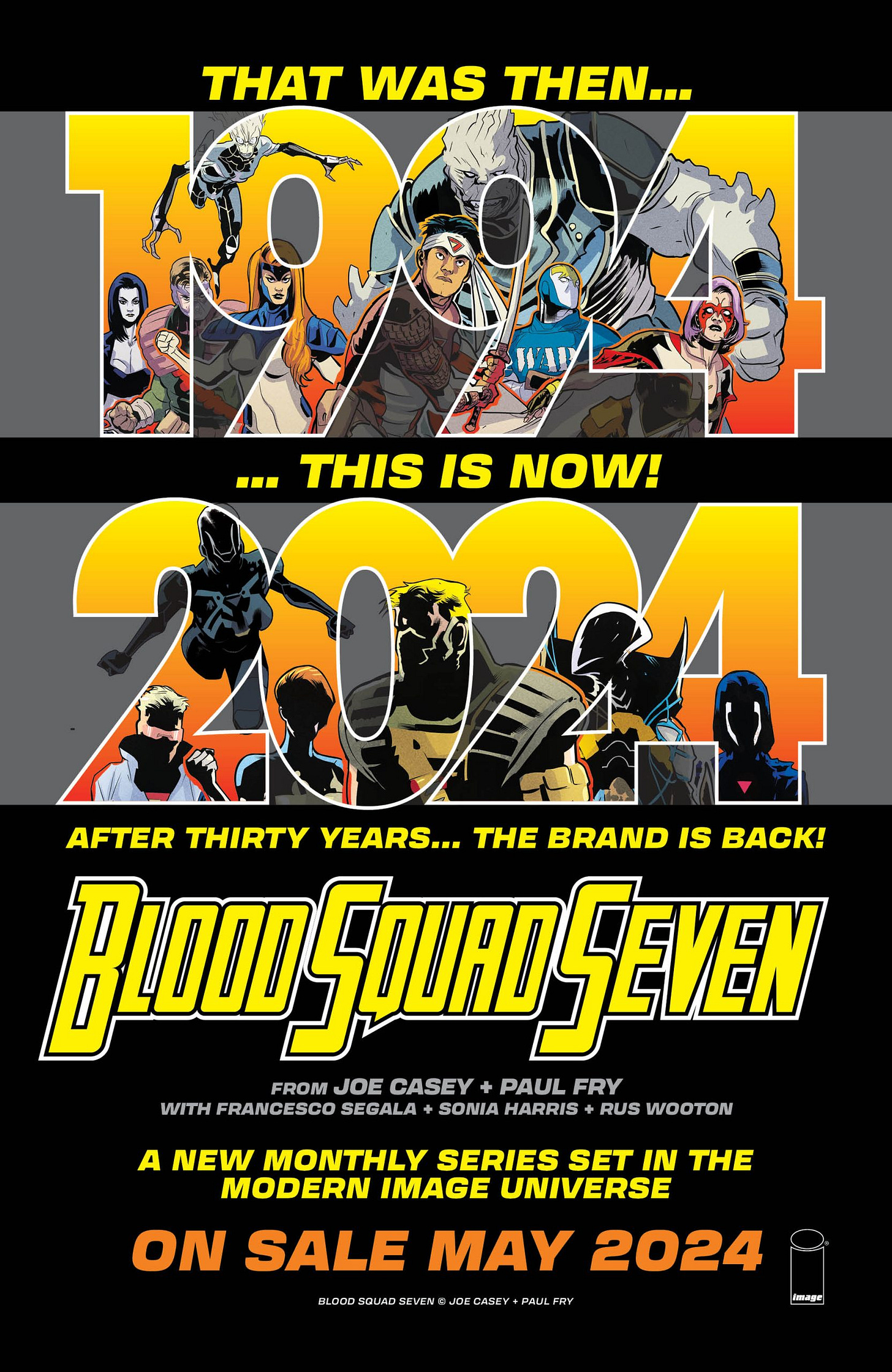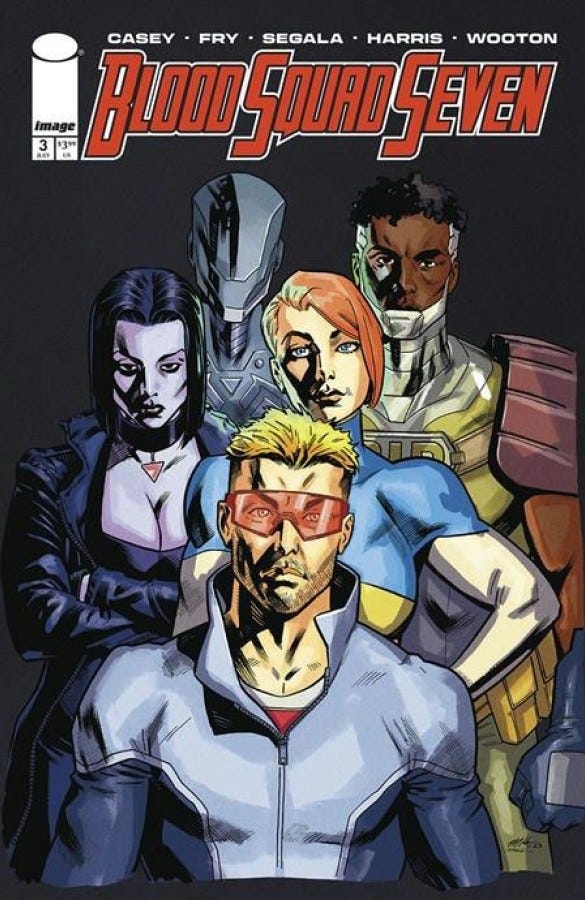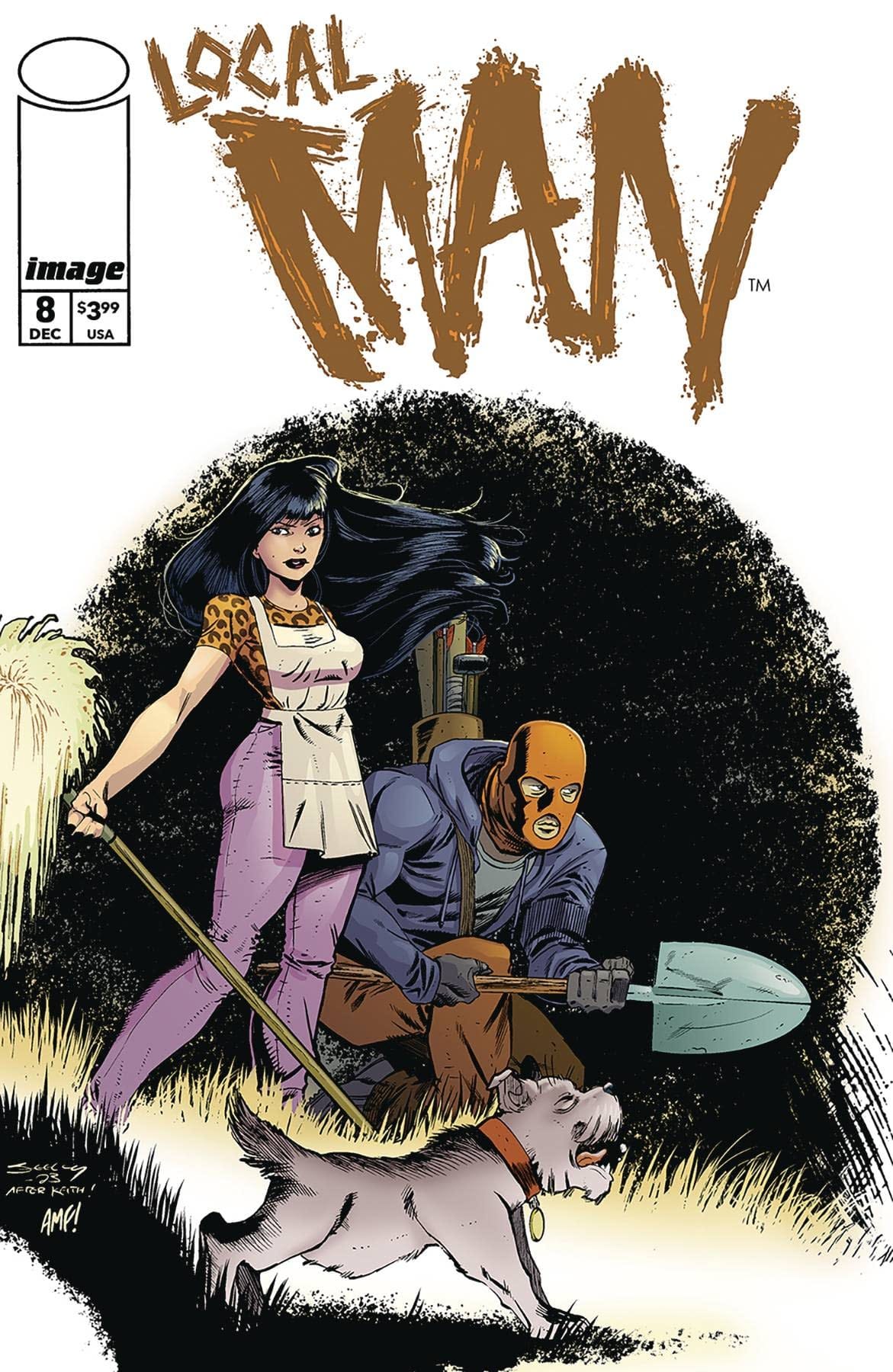So here I am again, not needing to worry about SEO. I basically said something about this in Lotusland Comics. But for time and editing purposes, some of what I said was removed. Especially what these two series represent. So to stroke my ego and go into depth I’m going to bring back what I wanted to say there here.
Background
For anyone who collected comics in the 90s, Image Comics had two imprints that broke off. One was Jim Lee’s Wildstorm, the other was Maximum…Awesome…whatever Liefeld called his share of the universe. But in the company’s fifth year, they broke off…technically. Paperwork wasn’t finalized for some years.
Before this happened, British Invasion writers like Alan Moore would create histories of different Image hero mantles. Basically creating epic histories that would evoke the feeling of finding older comic issues. Spawn, ShadowHawk, and Supreme would create impressions that reach older fans as much as their current ones. As described by Image tribute Hack/Slash: Kill Your Idols, these mantles became living stories bigger than the characters and creators.
30 years after the companies’ breakup, this method of memetic implantation was reinvented. This time new characters, teams, and histories are transplanted onto Image’s phantom limbs.
Local Man: The Effects of the 90s
Local Man according to its co-creator Tim Seeley is a series about the fear of failure. While the story doesn’t always address it directly, it explores the effects of Image Comics’ early success and how all of those days and gimmicks were the company’s peak. And how after that, things didn’t go quite right.
The title character and his old team are a combination of Wildstorm’s Gen13 and Liefeld’s Youngblood. …Mostly the latter. But rather than another reboot (complete with characters who are basically reskins), this series explores the effects of Youngblood’s branding. Specifically, superheroes as celebrities.
Past the hype and action, these characters are just LARPers who act like heroes but are really bad at caring. As a result, they’re a pack of entitled crybabies who can’t hold down real jobs and rely on PR and their handlers to get any respect. Mostly because their powers caused them to separate from humanity on a base level. Making the ability to hide from any insecurities behind bravado all the easier.
For the titular Jack Xaver, his glory days never trickled back to his hometown. And after his team leader scapegoated Jack for things not going his way, Jack lost any tolerance his town had left.
What That Means
I can’t help but feel like this is a feeling that went around Youngblood, Liefeld, Jim Lee’s decision to join DC, the speculator market, and more.
Youngblood was basically getting around as famous for being famous as Image’s first comic. It wasn’t alone in that field since Liefeld’s haphazard work schedule and treating everything under his roof as assets led to general mismanagement. Basically driven by bravado until the rights to Youngblood had to be sold off to a business partner. Which led to more friction down the line. Not unlike how Jack’s old team Third Gen turned their backs on him in accordance to their company’s backers to keep their careers going.
There’s also Fourth Gen, Third Gen’s junior team. This feels like commentary involving spin-offs and trying to suit them to a new direction. Youngblood had many spinoffs or extra titles that made following a story too difficult to deal with. Plus whenever Liefeld worked with more artists to create them, the conditions were terrible which got an investor to drop funding. Hence why Third Gen’s leader had Fourth Gen locked up in stasis for not meeting his conservative values. But to make up for his shareholder’s losses, Camo worked with someone to use Fourth Gen’s powers to make a disposable super powered work force.
As for Lee, one of the reasons he let Wildstorm be absorbed into DC was because the business side wasn’t just affecting his release schedule, it was cutting into being with his family. Something Jack was too late to realize, having never called or visit his parents back in his days as Crossjack. As such, they’re ashamed to have him back even before he became a pariah.
As for one little tidbit, the first arc in Local Man focuses on a character trying to succeed where Jack failed in being a better hero. Considering how much Youngblood was riddled with poor editing, release schedules, financial struggles, etc., it felt like anyone with even a fraction of talent could do better. Maybe even Wildstorm’s Stormwatch since it bled the company money until a new direction was taken.
Especially if those collectors felt cheated for having invested in merch and comics to resell, only for them to turn out mostly worthless. As is the case with this Deliverance Killer blaming Jack for not making Farmington more popular. Only to be as violent, entitled, and self-righteous, while having even less self-awareness. Failing to see he was a serial killer.
Blood Squad Seven (And Dutch): Building Off Failure
Blood Squad Seven is very much Joe Casey’s second attempt at doing Youngblood his way. While his run was nowhere near as celebrated as Alan Moore’s shorter one, he believed in the central concept’s potential more than Liefeld. Casey saw Youngblood as a government covert-op strike force that with celebrity status as a way to keep people distracted from shadier stuff.
Wait what?
Look all I know is that Liefeld hired him to rescript the original series. It wasn’t much but Joe Casey was a fan who made the IP more new-reader friendly.
Hence why Blood Squad Seven has some of the same pacing and characterizations from his run. All of the same new characters with reskins. Heck, one of them is all practically the same with a different name and costume. The one who appeared in that Obama issue.
But before that, Casey had to include what characters Image could still legally use. Characters like Dutch and Infiniti since they were owned by different people. Dutch’s new miniseries was a backdoor pilot…
…
Yeah…unlike Local Man, this sounds like a bunch of nothing. When I read Dutch only the last issue felt like the pace was actually moving. As for Blood Squad Seven, part of it felt like retreads between Casey’s original Youngblood run and with elements from Liefeld’s.
From what Casey says, these were tributes. Laymen’s terms, a lot more filling in the gaps than being it’s own thing.
But one thing Local Man, Dutch, and Blood Squad Seven share is this: the past might not legally be allowed to come up, but it still happened.
That’s what Blood Squad Seven is supposed to be, a more efficiently told part of history. A way to rebrand and try again without anymore legal kerfuffle. Even if there are times when it looks like they’re admitting they’re coming up short.
It’s Not My Fault I Failed!
But maybe that’s the point.
I’m starting to see both seri…uh…directions as growing and maturing despite those failures. Kind of like Venture Bros; people trapped by nostalgia and doomed to fail because of it.
While Local Man starts with the social anxiety horrors of being a failure, it builds off of that. It goes into how people who refuse to grow from those failures are doomed to be stuck. Whether that’s Jack, every arc or overarching villain, or even the side characters.
To oversimplify it looks like holding onto investments even though values and worth are fluxing. Jack was like this for a lot of people and when his value plummeted, people refused to see his worth. Oftentimes they blamed Jack for their losses even though most circumstances were beyond his or anyone else’s control. Jack’s aware of his failings and tries to grow from them, badly.
But just about everybody else just wants what they feel they’re owed. So when things don’t go their way, they try to turn what they think are liabilities into assets. But they lack the self-awareness to get any satisfaction so they get new liabilities.
Every villain in Dutch or Blood Squad Seven meanwhile is stuck trying to get their glory days. And were doomed to fail because of it. In contrast, Infiniti gets the job she always wanted since her team’s peak. Leading the Squad the way she could’ve without the baggage of before. But the way she interacts with her daughter (the new Infiniti) suggests the former superhero may be casting a shadow. All while dealing with echoes of Image’s past the old Infiniti tried to avoid.
It’s fitting that around the time Local Man’s last issue came out, Youngblood was announced to return to Image Comics. After seven years of being under the thumb of a greedy IP mogul who time and time again fails to change or learn from his failures, Youngblood’s license with him has expired.
What does that mean for the characters who replaced them? Youngblood’ll probably stay in their own universe. Or they might interact and cause identity crises. So long as they learn from their failures.






